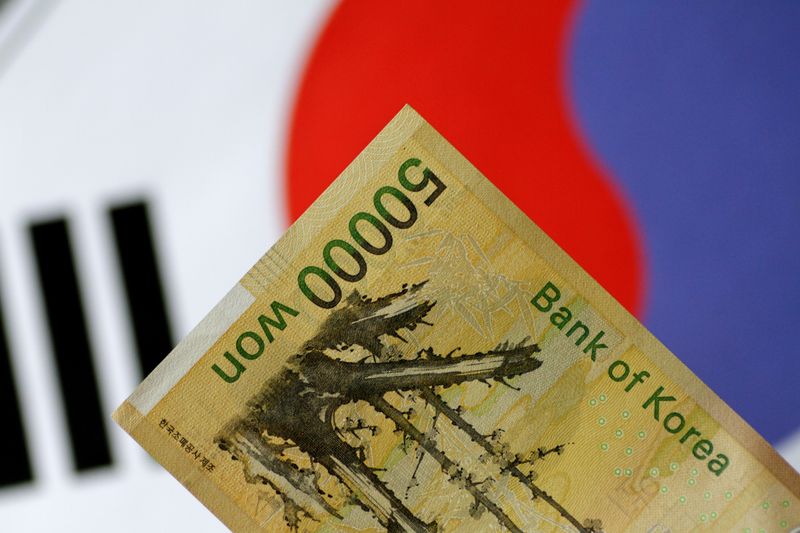As Samsung and Hyundai repatriate more earnings, weak won gets some reprieve
2023.09.21 06:55

© Reuters. A South Korea won note is seen in this illustration photo May 31, 2017. REUTERS/Thomas White/Illustration
2/2
By Yena Park, Jihoon Lee and Cynthia Kim
SEOUL (Reuters) – South Korea’s major exporters of cars and smartphones are bringing home a bigger chunk of their earnings this year to enjoy new tax breaks, and their ‘reshoring’ has become one rare source of support for a depreciating currency.
South Korean companies repatriated a record $33.13 billion of overseas earnings during the January-July period, 6.3 times the amount a year earlier, central bank data on current account balances showed.
The flows, the bulk of which is from globe-trotting exporters such as Samsung Electronics (KS:), Hyundai Motor (OTC:) Co and Kia Corp, are a welcome relief for the won which has been crushed by Korea’s falling exports and a broad U.S. dollar rally.
“The coming home of earnings retained abroad has been a big help for the won,” a government official in charge of foreign exchange market said, asking not to be named due to internal policy.
Bank of Korea officials say the volume of overseas earnings brought back home so far is nearly three times the $12 billion companies repatriated in all of 2022.
That rush comes after a tax break President Yoon Suk Yeol introduced this year to encourage reshoring of cash hoarded outside Korea, and allows up to 95% of corporate income generated abroad to be repatriated tax-free. Such repatriation was previously subject to corporate tax of as much as 25%.
The flows are a sizeable buffer for Korea’s balance of payments and the won, which has fallen for two years and is also down 5% this year.
The won has been the second most volatile currency in the first half after the Japanese yen among some 14 major currencies, a BOK analysis released by lawmaker Hong Sung-kook shows.
The $33 billion of repatriated money more than offsets the country’s $26 billion trade deficit in the first half of this year. In August, the country’s foreign exchange reserves dropped to the lowest level in nine months to $418.30 billion as authorities intervened to support the won.
“Capital reshoring has been a relief to the won,” said Min Gyeong-won, a currency analyst at local Woori Bank, adding that the flows had helped offset sluggish exports by becoming a source of dollars.
Samsung Electronics declined to comment for this story, when asked on the use and amount of the returned retained earning.
Hyundai Motor has used the tax break to channel money into investments. The automaker said on June 12 it plans to invest 7.8 trillion won ($5.82 billion) of retained earnings from overseas operations this year in electric car factories at home.
“Our primary goal is to (channel those repatriated funds) to expand production capacity of electric cars in the country, although not all of it (will be used for it),” a spokesperson at Hyundai Motor Group said.
“As for how much we will bring in next year, corporate savings from dividends for 2024 will be decided early next year.”
The surge in repatriation also comes ahead of trading reforms planned for next year, when South Korea will extend onshore trading hours until 2 a.m. to improve access for foreign investors. The dollar-won pair currently trades only up to 3:30 p.m. (0630 GMT)
“I reckon it (reshoring by exporters) helped cushion the won’s fall by about a fifth in the first half,” said Paik Seok-hyun, a senior economist at Shinhan Bank. “The trend is likely to continue albeit to a lesser extent.”
($1 = 1,340.7400 won)








